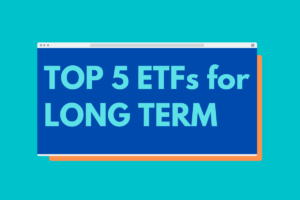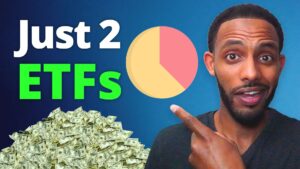T bills CDs, or high yield savings accounts. Today, I am going to break down each investment to find out which one is best for you. Let’s go ahead and start with T bills or treasurer bills. These are us government short term securities with term options that range from four weeks up to 52 weeks. You typically buy a T bill at a discount from the face value, which is also known as the par value.
You make money by holding that T bill until the end of the term, meaning until the end of that four week term up to that 52 week term. Treasury bills are considered low risk investments because these are backed by the U. S. government. These are not FDIC insured, so I don’t want you to be confused on that, but these are backed by the U.
S. government. You can actually buy T bills from a website called TreasuryDirectT bills. com. gov or through a bank or broker like Fidelity or Charles Schwab. Treasury direct. gov is a website that is run by the Bureau of the Fiscal Service under the United States Department of the Treasury that allows us individual investors to purchase treasury securities, such as treasury bills, T bills and savings bonds directly from the U S government.
Now, here are a few things you want to know before you invest in T bills your money. Is not easily accessible. Once you invest it, yes, there are no penalties for selling early, but you do have to go through a series of actions like selling that T bill if you want to be able to access that earlier than the actual maturity date by the end of the term, but you will get charged a commission.
There’s a good chance that you will get charged a commission. And of course, if interest rates continue to climb, that means the value of your T bill could be less if you try to sell it before maturity. So. This is why a lot of people will just say, Hey, hold on to that T bill until the end of the maturity date.
If interest rates do continue to climb, T bills are sold in increments of 100 up to what I found out, 10 million. Now, when it comes to taxes and the money you make with your treasury bills, you will owe federal taxes, but there are no state or local taxes that you will be owing. And so who are T bills for?
Well, These are for investors seeking low risk investments and may need the money within a year or shorter. Next up, let’s talk about certificates of deposit or CDs. Now, these are a type of savings account that have a fixed time period and typically higher interest rates than regular savings accounts, CDs are going to be FDIC insured up to whatever the limit is currently it’s 250, 000 terms for CDs can be as short as one month.
And as long as. 10 years. And that’s pretty impressive. Typically the longer the term for that CD, the higher the interest rate you can earn. Unlike T bills, the interest that you earn from a CD is subject to federal and state income tax. You can open a CD almost at any bank or. Credit Union that offers a CD, even at the bank that you’re currently at, check with them to see if they offer CDs.
One interesting point to make is CDs are actually referred to as share certificates at credit unions. So how much are CDs paying right now in September, 2023, some CDs pay a little over 7% APY if you live in the state of Michigan, only. for you, Michigan residents, congratulations. You’re going to be able to get a 7% APY on your CDs.
And if you don’t, well, don’t worry because there are CDs that are offering 5 to 6% APY from so many other financial institutions that you can find online. Now, if you needed to take your money out before the end of the term for that CD, the research I’ve done shows that you will get hit with a hefty penalty and it’s something you really don’t want to do.
You do have no penalty CDs available. Typically with shorter terms and lower yields. So that means you’re not going to make as much. So you want to make sure before you sign up for a no penalty CD or any other CD for that matter, you want to check what the penalty is going to be. If you do need to take that money out early, sometimes CDs are going to require higher minimum balance amounts.
And that just comes with trying to get a higher APY. And that’s typical with a lot of financial products from so many different banks and financial institutions. But when it comes to who a CD is. For I would say that a CD is for someone who’s looking to store money anywhere between one and five years and earn a decent interest on that money, knowing that they won’t need it until that one year mark or that five year mark.
Now, an interesting investment strategy that involves with CDs, and you can actually do this with. T bills too is called the CD ladder investment strategy. You basically divide that initial investment amount that you have into equal parts. So 10, 000 divided by let’s say five parts, that’s going to be 2, 000 for each CD that you’re going to buy.
And you’re going to buy a one year CD, a two year CD, a three year CD, a four year CD, and a five year CD. Now, when that one year CD matures, you take that money. And if you want, whatever you gain, whatever interest you earned and go buy a five year CD. So by the time, Each upcoming CD matures, you’re able to buy a five year CD and continue to have that ladder of CDs that are going to be earning you interest year by year by year.
That’s not a bad investment strategy to definitely think about next up. Let’s talk about high yield savings accounts. A high yield savings account is a savings account. Basically that offers a higher yield than your traditional savings account, meaning those savings accounts that you’re going to get at big name banks, high yield savings accounts are going to be FDIC insured up.
To the limits of the law, interest rates on high yield savings accounts can vary between 10 to 13 times more than traditional savings accounts. Now, the interest you earn in a high yield savings account is subject to federal and state tax. It’s very possible to open a high yield savings account at almost any financial institution or bank that’s available.
Just make sure that you are seeing that whatever interest rate that maybe your primary bank is offering for what they will call a high yield savings account. Is comparable with the ones that are online. Even some credit unions do offer a high yield savings account. But again, I want to make sure that you’re getting the best APY, the best interest on that account.
So make sure you compare it with other high yield savings accounts. I do have a video on some of the latest high yield savings accounts that you can find online. I’ll put a link of that video in the description below. And the reason I say this, because in September, 2023, some high yield savings accounts are offering anywhere from five to 5.
25% APY. While most of them are still in that four and a half or 4. 25 to 5% range. Some things you should know about high yield savings accounts. Sometimes you will have a minimum balance requirement to open a high yield savings account. Sometimes you’ll have fees. Now, the video I made. I try to cover only high yield savings accounts that don’t have fees and don’t have high minimum balance requirements, maybe a hundred dollar minimum balance requirement.
But those are the kind that I really like because the barrier of entry to be able to open a high yield savings account shouldn’t be very high. Everyone should be able to have. Uh, equal access to these great high yield savings accounts, in my opinion. Now, one disadvantage of having a high yield savings account is that the interest rate is not locked.
So unlike your T bills or your CDs, where you are able to get that interest rate for that longer term, a high yield savings account interest rate or APY that’s being offered can vary from day to day. So it can be 5% today. But tomorrow could drop down to four and a half percent and you’re not going to be locked into a high APY for the longterm.
So that is a very important fact that I want you to be aware of, especially if you’re trying to decide between the three investments. Now that money that you put in a high yield savings account is going to be easily accessible, especially compared to T bills and CDs. There aren’t any. penalties for taking your money out because it’s just a general savings account.
So you want to be aware when you’re making these decisions between a T bill, a CD, and even a high yield savings account, how easy is it for you to access the money in case you come up in an emergency where you need to get that money right away, or you need to help a friend, or you’re going to need to do something that is going to require money.
So who are high yields savings accounts for, well, it’s going to be for investors, for those folks out there who are looking to have maybe a short term savings account that can be easily accessed for personally me. That is what I like right now. Having a high yield savings account where I can have one to three months emergency fund, maybe up to six months of an emergency fund.
And with the rest of my money, I’m not really looking to invest in a CD or a T bill because right now I want to be building wealth and investing in the stock market, investing in ETFs and index funds.


